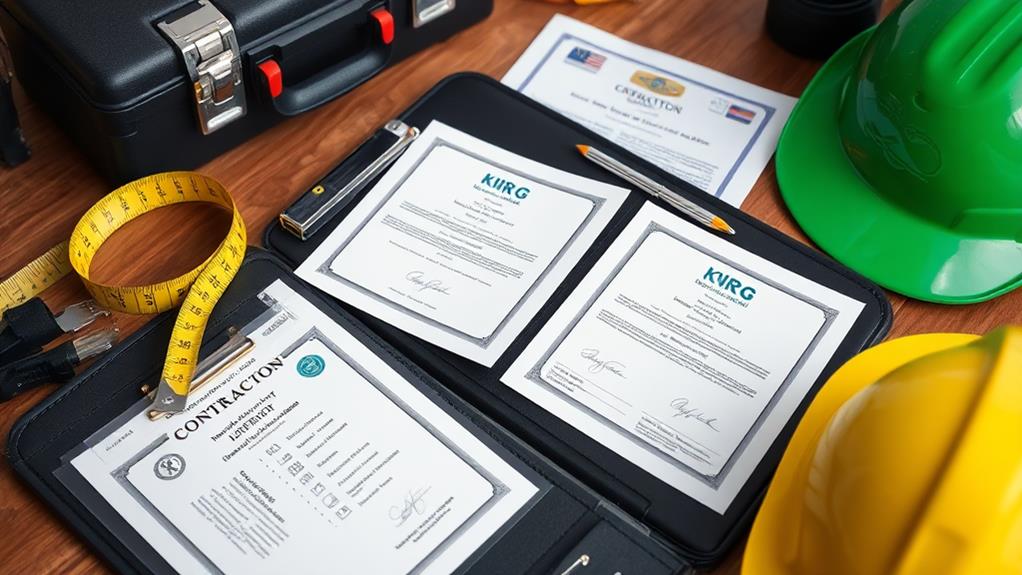When choosing trustworthy home contractors, start by asking friends and family for referrals. Check online reviews and consult local building inspectors for recommendations. Interview at least three contractors to compare their qualifications and communication styles. Make certain to verify their licensing and insurance status before hiring. Create a detailed project plan and contract, outlining costs and timelines to avoid misunderstandings. Establish a clear payment schedule tied to project milestones, and avoid paying large amounts upfront. Regularly monitor the project's progress and maintain open communication to address any issues that come up. There's more to explore about this topic to guarantee a successful project.
Contractor Recommendations and Research

When it comes to finding trustworthy home contractors, tapping into your network is a great first step. Start by asking trusted friends and family for contractor recommendations. Personal referrals often lead you to reliable contractors who've proven their quality work based on firsthand experiences.
You should also consult neighbors who've recently completed similar projects to hear about their satisfaction levels and contractor choices. Additionally, checking online review platforms for contractor ratings can provide valuable insights into their reputation and reliability.
Furthermore, don't overlook the value of professional associations like the National Association of the Remodeling Industry (NARI) and the National Association of Home Builders (NAHB). These organizations can help you find qualified contractors with credible backgrounds.
You can also consider reliable local contractors that have a history of positive feedback from customers.
Another smart move is to speak with local building inspectors and employees at lumberyards. They can provide insights into contractors known for their reliability and quality work.
Once you've gathered a list of potential contractors, it's important to conduct thorough background checks. Make sure to verify licenses, certifications, and insurance coverage to guarantee each contractor is legitimate and qualified for your project.
Taking these steps will help you select a trustworthy contractor who can bring your vision to life.
Conducting Interviews and Meetings
After gathering recommendations and conducting your research, it's time to meet potential contractors face-to-face. Start by arranging interviews with at least three contractors. This will help you compare their qualifications, approaches, and communication styles effectively.
During these meetings, prepare specific questions about project timelines, availability, and previous experience. This way, you can assess each contractor's suitability for your project.
Pay close attention to the contractor's responsiveness during initial contact. Prompt communication often reflects their professionalism and commitment.
When discussing your project in detail, clarify your expectations and see how well the contractor listens to your ideas and concerns. A reliable contractor will take the time to understand what you want.
Understanding Contractor Credentials

Understanding a contractor's credentials is essential to ensuring your project runs smoothly and meets your expectations. First, verify the contractor's licensing status with local authorities. This check confirms they're legally allowed to operate in your area and comply with industry regulations.
You should also confirm that they've adequate insurance coverage, including liability and workers' compensation, to protect yourself from potential financial risks during the project.
Next, investigate the contractor's membership in professional associations, such as the National Association of the Remodeling Industry (NARI) or the National Association of Home Builders (NAHB). Membership in these organizations often indicates a commitment to industry standards and best practices.
Additionally, reviewing any disciplinary actions or complaints filed against the contractor through state licensing boards or consumer protection agencies can help you gauge their reputation and reliability.
Lastly, assess the contractor's experience by asking about their years in business and requesting examples of past work similar to your renovation needs.
Project Planning and Contract Essentials
Once you've verified a contractor's credentials, it's time to focus on project planning and contract essentials. Start by developing a detailed project plan that outlines the scope, costs, and timelines. This plan will help you facilitate accurate contractor bids and minimize misunderstandings later on.
Request detailed cost breakdowns from each contractor to guarantee transparency in pricing, which prevents unexpected expenses during your project.
Next, include clear payment terms in the contract. A structured payment schedule with deposits and milestone payments will mitigate financial risks and guarantee accountability from both sides.
It's vital to outline specific clauses for change orders and unforeseen costs. This way, both you and the contractor understand how to handle any modifications that may arise during the project.
Negotiating Payment and Lien Releases

When you're negotiating with contractors, setting up a clear payment schedule is essential for keeping the project on track.
Consider linking payments to specific milestones, like paying 10% at signing and 25% at key intervals, which helps protect your finances.
Additionally, make sure to include lien release requirements in your contract, so you can confirm that all suppliers get paid and avoid any unexpected claims down the road.
Payment Schedule Structure
Establishing a clear payment schedule is essential for protecting yourself during a home renovation project. When you hire a contractor for your project, make sure to create a structured payment schedule linked to project milestones. For example, you might pay 10% at signing, 25% at certain intervals, and the final 15% upon completion. This approach helps guarantee financial protection throughout the renovation.
It's important to avoid large upfront payments, as they can increase your financial risk. Instead, aim to pay only for work that's been completed satisfactorily.
To further safeguard your interests, include a requirement for lien releases in your contract. These releases protect you from potential claims by suppliers or subcontractors if the contractor fails to pay them.
Always request lien releases before making any payments. This practice keeps you safe from unpaid debts that could affect your property.
Additionally, clearly outline terms for payment adjustments and additional costs in your contract. Doing so helps prevent disputes over unexpected expenses during the project, allowing for a smoother renovation experience.
Lien Release Requirements
Lien releases are fundamental in protecting your investment during a home renovation. When you hire a contractor, it's imperative to make certain that they pay their subcontractors and suppliers. If they don't, a mechanics lien could be placed on your property, potentially leading to its forced sale to cover unpaid debts. That's why obtaining lien releases from all parties involved is essential before making any payments.
Make sure your contract explicitly states when lien releases should be presented, typically before final payments are made. This requirement not only safeguards your finances but also keeps the project on track.
Additionally, request copies of receipts for all materials used in the project. This verification helps confirm that payments have been made to suppliers, minimizing the risk of liens.
Establishing a structured payment schedule linked to project milestones can also help manage financial risks. By making payments in alignment with completed work, you maintain control and accountability.
Monitoring Project Progress and Communication
Effective communication is essential for guaranteeing your home renovation project stays on track. To effectively monitor project progress, maintain regular check-ins with your contractor. These scheduled meetings help you discuss project updates and address issues before they escalate.
Be proactive in evaluating the quality of work by scheduling periodic site visits. This way, you can guarantee the contractors' work aligns with your vision and adheres to the project timeline.
It's also vital to document all communications and agreements. This creates a clear record for reference in case any disputes arise. Regularly review the project timeline and budget with your contractor to keep everything on track. This practice helps you identify potential delays or cost overruns early on.
Establishing a clear system for addressing issues or changes as they arise fosters a collaborative environment. This approach keeps the project moving smoothly and encourages open communication.
Conclusion
Choosing the right home contractor can feel overwhelming, but it doesn't have to be. By following these tips, you can make informed decisions that lead to successful projects. Picture your dream renovation coming to life as you conduct thorough research, ask the right questions, and establish clear communication. Trust your instincts, stay organized, and don't hesitate to seek help when needed. With careful planning and attention, you can turn your vision into reality with a trustworthy contractor by your side.


Leave a Reply